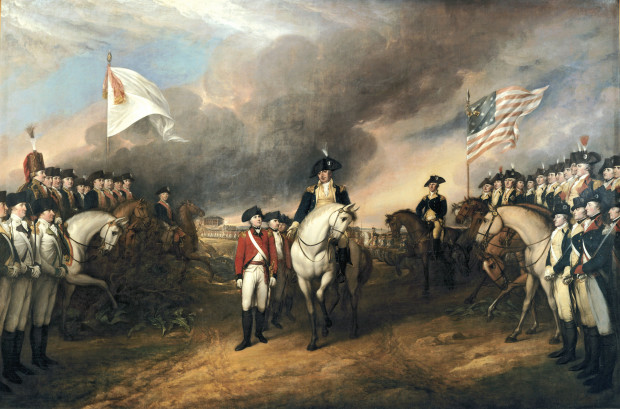
War stories. They help shape a nation’s identity.
But if these stories sweep facts under the rug, they are ‘foundation legends,’ not history. I tell the stories our schoolbooks often leave out, the stories that don’t fit the tidy patriotic version that makes us feel proud but are not always complete or true. The real story – the “warts-and-all-version”—is always more interesting and more instructive.
Here are some “Did-you-know” facts from my newly published The Hidden History of America At War –from the American Revolution to the War in Iraq.
THE AMERICAN REVOLUTION
- George Washington gets credit for winning the American Revolution. But without the French Navy, foreign loans and sacrifices by black patriots, the cause might have been lost. Washington, a slaveholder, didn’t want black men in his army. But when he got desperate for troops he opened his ranks to black soldiers and he was impressed at how bravely they fought.
- John Laurens isn’t a household name like Thomas Jefferson and John Adams. But this “forgotten founder” helped lead the fight at the decisive battle of the American Revolution at Yorktown, Virginia, and was a voice of conscience who tried to convince George Washington, a slaveholder– to embrace abolition.
- The son of a major slave trader, John Laurens was so intent on enlisting blacks in the military that he designed a uniform for African Americans.
- It’s inspiring to think that patriotic “Minutemen” grabbed their trusty muskets and left their farms to whip the mighty British redcoats in the American Revolution. But that is not how the Revolution was won. George Washington was wary of the militias who often wanted and needed to get back to their shops and farms. Washington insisted on a trained, disciplined, standing army. Irish and German immigrants, out of work teenagers and African Americans filled the ranks of his Continental Army. But these “rabble” frightened the founding generation. The Minutemen and other militiamen come down in lore as patriots ready to take up arms and defend freedom. But Washington thought militias were undependable, calling them a “broken staff.”
- Heroic images of “Washington Crossing the Delaware” don’t hint at what happened later in New Jersey when his drunken troops mutinied –he had the ringleaders executed by firing squad. Washington was a strict disciplinarian who once built high gallows and threatened to hang American deserters.
- American troops fought bravely in securing victory over the British at Yorktown. But two overlooked factors helped defeat the British: disease and the burden of harboring refuges, slaves who flocked to the British in hopes of being emancipated.
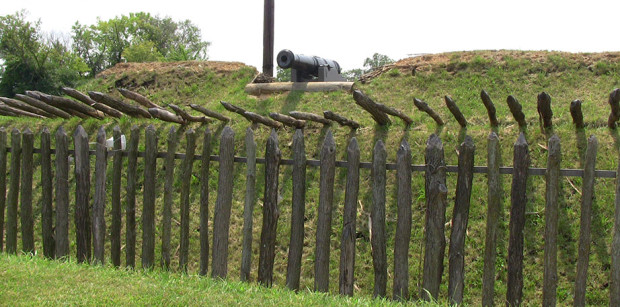
Recreation of Redoubt # 10 at Yorktown (U.S Army War College-Army Heritage and Education Center)
- Fear of leaving slaves in charge of the homestead kept men in Virginia and other slaveholding from joining the militia during the Revolution.
- Washington and Jefferson made sure to collect their runaway slaves when the Revolution ended. The American Revolution was fought to protect “Life, Liberty and the Pursuit of Happiness.” But insuring the continuation of slavery was high on the list of priorities for the new nation.
- After the Revolution, Marquis de Lafayette had a plan to buy land where Washington could free his slaves and set an example of abolition. But Washington never took up the offer.
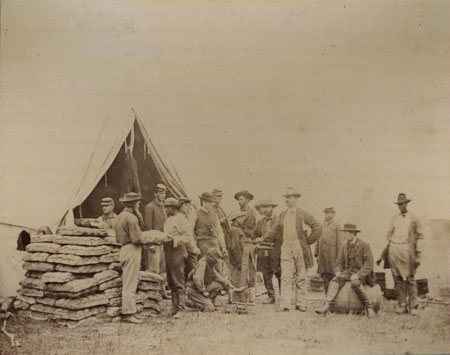
Civil War Commissary Cabin (Source U.S. Army War College/Heritage and Education Center)
THE CIVIL WAR
- Military casualties in the Civil War are well documented. But also horrific are the civilian tolls in places like Petersburg, Virginia, which was the scene of a nearly yearlong siege. The situation in Petersburg got so dire for the civilians that some held macabre “Starvation Parties” with no refreshments served. Flocks of local birds disappeared and local butchers sold “mystery meat.”
- Lincoln initially resisted letting blacks join the army during the CivilWar. But by the end of the war, “Colored Troops” made up 10% of the Union Army. When U.S. Colored Troops” were admitted to the Union ranks during the Civil War, they often got the dirty work such as collecting the dead bodies and were paid less than white soldiers.
THE SPANISH AMERICAN WAR
- President William McKinley couldn’t locate the Philippines after annexing them during the Spanish American War.
- Water torture didn’t begain in Iraq. Americans used the “water cure,” a form of torture, in the Spanish American War. At Senate Hearings in 1902, William Taft testified about use of the “water cure” on people in the Philippines by Americans, a national scandal that reached all the way to Theodore Roosevelt’s White House.

Theodore Roosevelt (Photo Source: NobelPrize.org)
- Anti-Catholic venom is an overlooked reason why WASP America wanted to liberate Cuba from Spain during the Spanish American War.
- Black soldiers were mistakenly thought to be immune from tropical diseases. That was one reason they were sent to fight in Cuba during the Spanish American war.
- The “Buffalo Soldiers,” who were black men, fought bravely in Cuba during the Spanish American War. But Teddy Roosevelt who led the Rough Riders got the headlines and glory and later revised the story of what really happened to reap self-aggrandizing benefits.
- President William McKinley professed to have been divinely inspired to annex the Philippines and “Christianize” this largely Catholic country during the Spanish American War.
- The great American writer Mark Twain opposed American imperialism and wrote about replacing the American flag with one featuring black stripes and skull and crossbones.
- Racist policies surrounded Teddy Roosevelt’s “Great White Fleet.” Black sailors who had served and fought on American ships since the Revolution, were kept from service except in the boiler rooms.
WORLD WAR II
- Widespread sexual violence was inflicted on women during the Battle of Berlin. Among the causes: the practice of issuing vodka to the Red Army. The number of women raped by the Soviet troops in Berlin is estimated between 95,000 and 133,000, with as many as 10,000 deaths as a result—many from suicide; altogether two million German women are thought to have been raped by the Soviet Red Army troops.
- The Red Army crushed the Nazis at the close of World War II but Cold War animosities kept their crucial role out of America’s “Good War” narrative.
- General Dwight Eisenhower didn’t know the Germans had been developing atomic weapons or about the Manhattan Project when he agreed to let Stalin take Berlin.
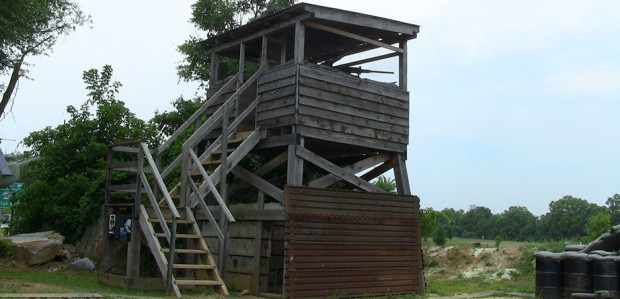
Vietnam Fire Support Base (Model) at the US Army War College- Army Heritage and Education Center
THE VIETNAM WAR
- As President, Eisenhower weighed and then dismissed using atomic weapons in Vietnam. Seeing what devastation the atomic bombs had wreaked on Japan influenced Eisenhower to not use these weapons again, especially against an Asian country.
- When television news reports brought the “Living Room War” of Vietnam into American homes and showed how the U.S. Government was lying, reporters became as significant as the troops. The media let the public in on what was really going on– America was not winning the war.
- Vietnam wasn’t only about Communism and “falling dominoes.” It was about Catholic versus Buddhist, government corruption and longstanding class differences inside Vietnam.
- The Gulf of Tonkin Resolution, which gave President Johnson authority to widen America’s role in the Vietnam conflict, was drafted weeks before the questionable attack on American ships– which triggered the resolution.
- The My Lai Massacre received wide media attention but purported atrocities and the killing of as many as 3,000 Vietnamese in the city of Hue got little notice.
THE WAR IN IRAQ
- The battle for Fallujah exposed how little Americans knew about who was fighting the war in Iraq. “Handsome Johnny” had been replaced as a fighter as the war was being outsourced to private, for-profit contractors in Iraq in an unprecedented way. The American troops were once referred to as a “junior partner” in the war effort.
© 2015 Kenneth C. Davis All rights reserved
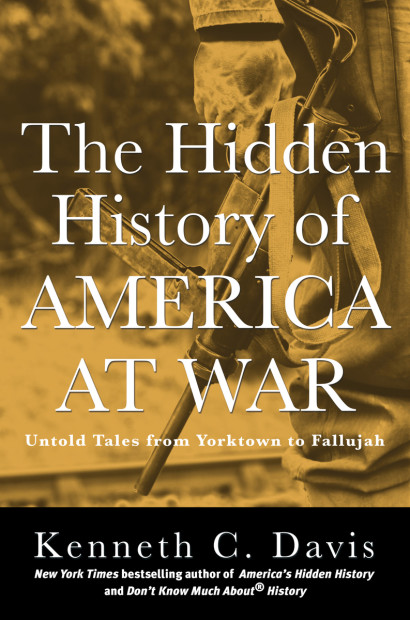
The Hidden History of America At War (Hachette Books Random House Audio)





